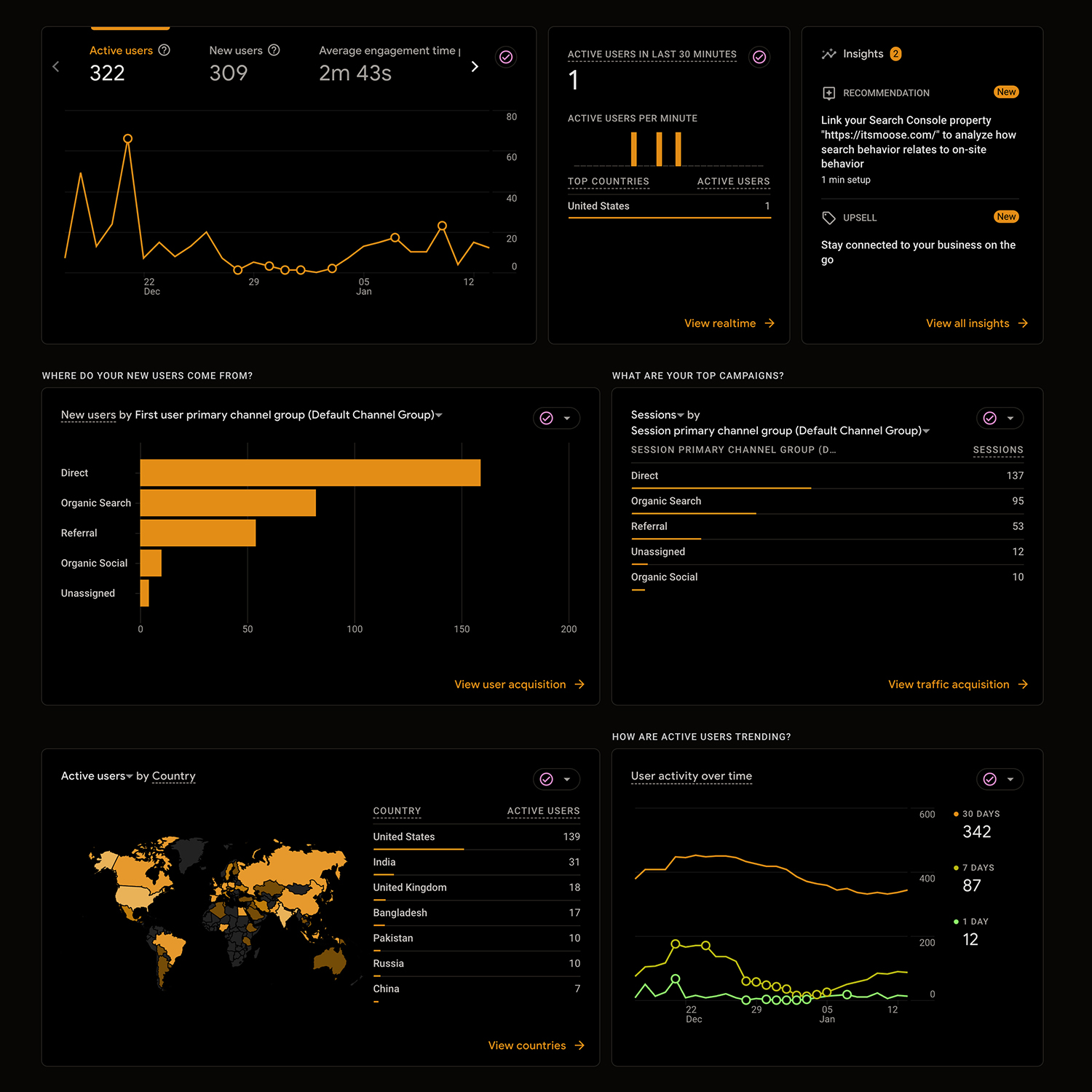In the digital marketing industry, Google Analytics plays a vital role. As a powerful analytical tool, it provides businesses with critical insights. These insights help business owners make informed decisions about their digital marketing strategies. This article explores how Google Analytics can enhance your marketing performance, align with business goals, and support effective digital campaigns.
Understanding Google Analytics
Google Analytics is an essential part of any digital marketing agency’s toolkit. It offers comprehensive insights into website performance and user behavior. With these insights, a web design agency can better tailor websites to meet user needs. The tool enables businesses to track user engagement, conversions, and traffic sources effectively.
Using Google Analytics, a business owner can analyze their audience demographics and interests. This data is crucial for shaping a customer-centric measurement framework. Furthermore, it helps refine the content strategy based on user behavior. The ability to track the consumer journey allows marketers to understand how users interact with their brand online.
Benefits of Google Analytics for Digital Marketing
- Informed Decisions: Google Analytics provides detailed reports. These reports empower business owners to make informed decisions. As a result, marketers can adjust their SEO strategy based on real-time data.
- Comprehensive Insights: The tool reveals comprehensive insights about website traffic. By understanding traffic patterns, businesses can optimize their digital marketing analytics. This optimization leads to improved online visibility and better targeting of marketing platforms.
- Tracking Campaign Goals: Google Analytics allows users to monitor the effectiveness of their digital campaigns. By setting specific campaign goals, marketers can gauge what works and what doesn’t.
- Enhancing Marketing Performance: By analyzing data, businesses can enhance their marketing performance. Google Analytics helps identify underperforming areas, allowing for immediate improvements.
- SEO Strategy Development: SEO is crucial for any digital marketing strategy. Google Analytics provides insights into organic search performance. By analyzing this data, businesses can refine their SEO strategy to increase website traffic.
How to Use Google Analytics Effectively
To maximize the benefits of Google Analytics, businesses must use it effectively. Here are several strategies to get started:
- Set Clear Marketing Goals: Before diving into the data, establish clear marketing goals. Knowing what you want to achieve helps focus your analysis. Align your goals with your overall business objectives.
- Leverage Advanced Tools: Google Analytics offers advanced tools for tracking user behavior. Utilize features like event tracking to understand user interactions on your website. This data informs your web design and SEO strategies.
- Analyze Traffic Sources: Understanding where your traffic comes from is crucial. Google Analytics breaks down traffic sources into categories. These categories include organic search, direct traffic, referrals, and social media.
- Monitor User Behavior: To improve user experience, analyze user behavior on your website. Identify which pages have high bounce rates. High bounce rates may indicate a need for better content or design changes.
- Integrate with Other Tools: Google Analytics integrates seamlessly with other marketing platforms. Use these integrations to enhance your digital marketing analytics. For instance, combining Google Analytics with CRM tools can provide deeper insights into customer interactions.
Google Analytics and the Customer Journey
Understanding the customer journey is crucial for digital marketing success. Google Analytics is a powerful tool for tracking user paths. It provides valuable insights into user behavior across a wide range of website activities. These insights help identify drop-off points and improve the conversion rate.
Marketers use this data to align marketing efforts with business goals. Data-driven insights optimize the user experience and guide users toward conversion goals. Tracking key metrics such as engagement rates and organic traffic reveals how users interact with your website.
Analyzing user paths uncovers patterns that show how to better engage users. Insights into a target audience’s behavior help design strategies for higher engagement rates. A web design agency creates websites that support digital marketing performance by focusing on user-friendly design.
Tracking data over a specific time period provides trends in digital marketing performance. These trends reveal areas where businesses can refine strategies to align with customer needs. Focusing on user behavior ensures that marketing efforts deliver measurable results.
Optimized websites guide users through the sales funnel and meet conversion goals. Enhancing the user experience improves overall engagement rates and builds loyalty. Understanding key metrics transforms valuable insights into actionable steps for business growth.
Optimizing Your Content Strategy
Content is at the heart of digital marketing. Google Analytics helps you spot trends and refine your content strategy. By tracking page views, time on page, and engagement metrics, businesses identify their top-performing digital content.
Understanding customer engagement allows marketers to align efforts with audience preferences. For example, education levels of your audience influence which blog post topics work best. Practical advice in blog posts ensures content meets industry standards and resonates with a wide range of readers. Optimizing posts with SEO best practices increases organic traffic and boosts visibility.
Publishers benefit from staying updated on industry changes. Consistently reviewing and improving digital content helps businesses meet changing search engine optimization requirements. Utilizing publisher tools helps streamline the process of updating and distributing relevant content. This continuous attention to industry changes maintains a competitive edge and strengthens the overall content strategy.
Future content strategies depend on analyzing data from past performance. Google Analytics reveals how audience preferences evolve, guiding the creation of fresh, relevant content. Incorporating these insights into business objectives ensures that marketing efforts remain aligned with customer needs. With this approach, digital marketing campaigns stay effective, dynamic, and responsive.
Web Design, SEO and Google Analytics
Search engine optimization (SEO) is a cornerstone of online success, and Google Analytics is an indispensable tool for tracking and enhancing your SEO efforts. By analyzing organic search traffic, businesses gain actionable insights into the performance of specific keywords. This analysis enables organizations to refine their SEO strategy, focusing on high-performing keywords that resonate with their target audience. The result? Improved visibility, increased organic traffic, and a stronger overall digital marketing performance.
A well-optimized WordPress website is pivotal in this process. A web design agency that specializes in WordPress website design can leverage Google Analytics to ensure seamless integration between your website and your marketing channels. The agency can utilize advanced analytics tools, such as Google Analytics 4 (GA4) and Universal Analytics, to assess your site’s performance, identify areas for improvement, and create a performance-driven marketing plan tailored to your business goals.
These tools provide predictive insights that help businesses align their digital marketing efforts with user intent, ensuring that the types of content they create—whether blog posts, landing pages, or product descriptions—effectively engage their audience. By analyzing what types of content resonate with visitors and spotting trends, businesses can deliver relevant content that drives conversions.
Moreover, using Google Analytics to monitor your conversion rate ensures that your SEO and digital marketing strategies are not just about driving traffic but also about turning visitors into customers. With analytical insights into customer behavior, businesses can uncover opportunities to enhance their online presence and craft an effective marketing approach.
Integrating SEO, Google Analytics, and WordPress web design is critical for maximizing organic traffic, identifying growth opportunities, and delivering measurable results.
The Future of Digital Marketing with Google Analytics
As digital marketing continues to evolve, Google Analytics remains a cornerstone for understanding and leveraging audience behaviors. The platform’s continuous updates and integrations ensure it stays ahead of industry standards, making it indispensable for businesses aiming to refine their marketing campaigns. Notably, the introduction of Google Analytics 4 has revolutionized how businesses monitor user behavior, offering real-time data tracking and enabling marketers to spot trends and predict future customer actions with greater accuracy.
For business owners, this shift marks an opportunity to align business objectives with a data-driven decision-making approach. With more structured approaches to data collection and analysis, companies can glean deeper customer insights and adapt their strategies to future content strategies that resonate with their audiences. This capability to tailor effective marketing efforts in real time not only fosters improved engagement but also ensures businesses remain agile and competitive in rapidly changing markets.
Additionally, by paying close attention to industry changes and subscribing to industry newsletters, marketers can stay informed about future trends and leverage the tool’s features to make informed, data-led decisions. Accurate and advanced tracking empowers brands to anticipate audience needs, craft innovative solutions, and set benchmarks for success. As Google Analytics evolves, businesses that embrace its advanced capabilities will find themselves better equipped to achieve sustainable growth and exceed customer expectations.
Why Google Analytics Matters for Business Owners
For business owners, Google Analytics offers a competitive edge. It helps them understand their audience, track marketing performance, and achieve business goals. The platform’s user-friendly interface and advanced tools make it an indispensable resource for any digital marketing strategy.
How ItsMoose.com Leverages Google Analytics for Digital Marketing Success
Google Analytics is a powerful ally for any digital marketing agency. Its ability to provide critical insights and comprehensive data makes it essential for marketing success. By using Google Analytics effectively, businesses can enhance their web design, refine their SEO strategies, and improve their overall marketing performance.
Whether you are a business owner or a marketer, understanding Google Analytics is crucial. It allows you to make informed decisions that align with your marketing goals. Ultimately, leveraging Google Analytics leads to better online visibility and a successful customer journey.
For digital marketing agencies, mastering Google Analytics is not just beneficial; it is necessary. As you navigate the complexities of digital marketing, use this tool to drive your strategies forward. With Google Analytics, you can ensure that your digital campaigns meet and exceed your business goals.




